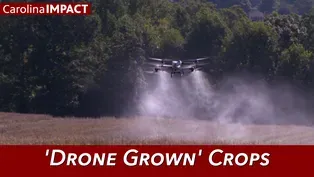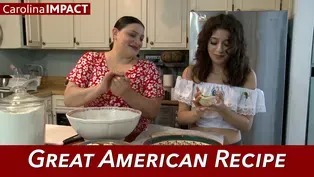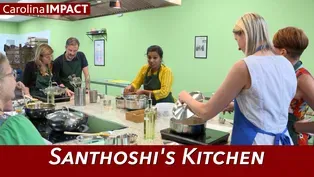
Black On The Farm
Clip: Season 12 Episode 1201 | 5m 41sVideo has Closed Captions
See why there’s a growing trend of African Americans becoming farmers and owning land.
Since the start of our nation, African Americans have worked the land. Yet, over the past century, the number of African American-owned farms declined and so did land ownership. Now, there’s a growing trend of them heading back to the concept of farming.
Problems with Closed Captions? Closed Captioning Feedback
Problems with Closed Captions? Closed Captioning Feedback
Carolina Impact is a local public television program presented by PBS Charlotte

Black On The Farm
Clip: Season 12 Episode 1201 | 5m 41sVideo has Closed Captions
Since the start of our nation, African Americans have worked the land. Yet, over the past century, the number of African American-owned farms declined and so did land ownership. Now, there’s a growing trend of them heading back to the concept of farming.
Problems with Closed Captions? Closed Captioning Feedback
How to Watch Carolina Impact
Carolina Impact is available to stream on pbs.org and the free PBS App, available on iPhone, Apple TV, Android TV, Android smartphones, Amazon Fire TV, Amazon Fire Tablet, Roku, Samsung Smart TV, and Vizio.

Introducing PBS Charlotte Passport
Now you can stream more of your favorite PBS shows including Masterpiece, NOVA, Nature, Great British Baking Show and many more — online and in the PBS Video app.Providing Support for PBS.org
Learn Moreabout PBS online sponsorship(gentle music) - A gentle farmer.
I just love introducing this way of life to other people, - Cutting grass and trimming trees and doing bushes and stuff.
And we started thinking like we need a area to grow food.
We wanna have food for our family, especially for our children.
- [Beatrice] From a rural farm that continues a family tradition, to an urban farm that has become a family business, African Americans are finding themselves part of a trend that is taking many back to the land.
- I was married into the family and learning, being so intrigued right, about the farming aspect and the history of Massey Farms.
- [Beatrice] The Massey Farm in Chester County, South Carolina has been in existence for five generations, but across the country, the share of black farmers and farms has declined significantly over the last century.
Today, just 1.4% of farmers identify as black.
- [Tammy] Great granddaddy, he tilled the land, he taught his children, they lived off the land.
Fruit, vegetable, fruit trees.
- Descendants of enslaved people who've gone through the history that we've gone through.
For us as a family to stand in this space of owning land and farming it, I mean it's a tremendous accomplishment to say the least.
- [Beatrice] Wisdom and Cherie Jzar look back at a pandemic that launched their home food forest into becoming more than just a garden patch.
- We initially wanted to just be able to have the control of our own food, where it comes from, and utilizing our land for more than beauty.
- [Beatrice] What they found was that they could make a viable family business.
Farming seven acres and half a year, Deep Roots has grossed more than $70,000 with projections for more than 100,000 by years in - And access to land.
- There it is.
- [Cherie] Access to land.
You can easily get the knowledge right, you can get the support from other farmers in this region, but if you don't have land, you can't grow.
- [Beatrice] Accessing land and money can be barriers.
The history of the federal government, the USDA and black farmers has not been an easy one.
Many black farmers have fought policies that kept them from receiving government loans like other farmers.
- And we're gonna seek the support of the USDA and the farm service agency.
As a matter of fact, I serve as a advisor on the Farm Service Agency Board because I needed to know what y'all talking about so I could share it back with the farmers who didn't have that access.
- [Beatrice] Both sets of farmers point out individuals have to educate themselves, not only on the business side.
- Before we started the farm business, I took like 12 months of going to different farmer's markets.
So like studying who is farming in our community and what are they bringing to market and where are the markets?
- [Beatrice] But the nuts and bolts of agriculture and the care of animals.
- When you live here, you gotta learn what it all, what all it is about, right?
So I attended South Carolina Farmers Education and I became a new and beginning farmer.
Woo-ooh.
Are they, and running too.
Look at.
(Tammy calling) - [Beatrice] From alpacas for sheared fiber to beef cows for meat and chickens for eggs, the Massey Farm provides for its family, but it also provides for participants and William's non-profit called Battered but Not Broken, providing a way forward for formerly incarcerated women.
- If it wasn't for the desire of women being or having the desire to want to eat healthy, to want to just give back.
So we come, we harvest vegetables and we give it to local food banks.
- [Beatrice] In Mecklenburg County, the Jzars decided Deep Roots needed to go deeper into the community.
- [Cherie] That's like a strong passion of ours.
- Yeah.
- We were able to inspire it in our own children.
Our son works here full-time now and he's 19 and he knows this is the path that he wants to take.
- [Beatrice] Deep Roots produce can be found at several farmer's markets in the Charlotte area.
At the same time, they're creating jobs.
- We're creating workforce development because we got people working here who are not working at Amazon, who aren't working at all these other places.
They're getting paid $15, $16, $17 per hour.
- [Beatrice] From feeding and taking care of animals to harvesting foods to take to market.
Each farmer has their reasons for choosing this life.
- To see and feel putting my hands in the earth, in the soil and what it did to my spirit.
- [Wisdom] Not just grow more vegetables, but grow more farmers.
- [Beatrice] And they want others to know their way of life is more than a caricature of a barnyard.
For "Carolina Impact", I'm Bea Thompson.
Carolina Impact | September 17th, 2024
Preview: S12 Ep1201 | 30s | Home grown & "drone grown", Black on the Farm, Santhoshi's Kitchen, and The Great American Recipe. (30s)
Video has Closed Captions
Clip: S12 Ep1201 | 5m 58s | Home grown & 'drone grown' -- Carolina farmers use new technology to raise better crops. (5m 58s)
Video has Closed Captions
Clip: S12 Ep1201 | 6m 4s | Two local contestants compete on season three of PBS's The Great American Recipe. (6m 4s)
Video has Closed Captions
Clip: S12 Ep1201 | 5m 25s | A Fort Mill chef follows her dreams while teaching others about Indian cuisine. (5m 25s)
Providing Support for PBS.org
Learn Moreabout PBS online sponsorshipSupport for PBS provided by:
Carolina Impact is a local public television program presented by PBS Charlotte














